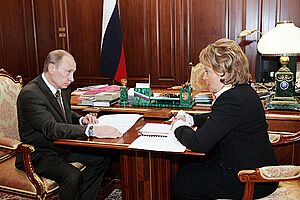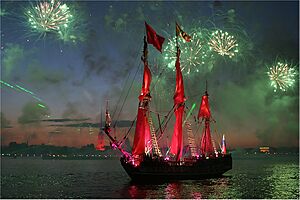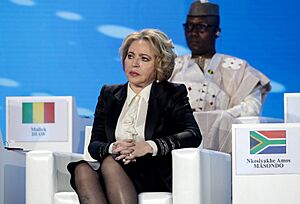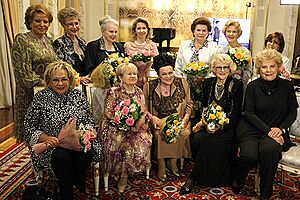Valentina Matviyenko facts for kids
Quick facts for kids
Valentina Matviyenko
|
|
|---|---|
|
Валентина Матвиенко
|
|
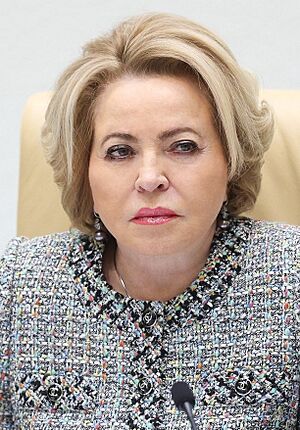
Matviyenko in 2025
|
|
| 4th Chairwoman of the Federation Council | |
| Assumed office 21 September 2011 |
|
| Preceded by | Alexander Torshin (acting) Sergei Mironov |
| Russian Federation Senator from Saint Petersburg |
|
| Assumed office 31 August 2011 |
|
| Preceded by | Vladimir Barkanov |
| 3rd Governor of Saint Petersburg | |
| In office 15 October 2003 – 22 August 2011 |
|
| Preceded by | Alexander Beglov (acting) Vladimir Yakovlev |
| Succeeded by | Georgy Poltavchenko |
| 2nd Presidential Envoy to the Northwestern Federal District | |
| In office 11 March 2003 – 15 October 2003 |
|
| President | Vladimir Putin |
| Preceded by | Victor Cherkesov |
| Succeeded by | Ilya Klebanov |
| Deputy Prime Minister of Russia for Welfare |
|
| In office 24 September 1998 – 11 March 2003 |
|
| Prime Minister |
|
| Preceded by | Portfolio established |
| Succeeded by | Portfolio abolished |
| Russian Ambassador to Greece (Hellenic Republic) | |
| In office 1997–1998 |
|
| President | Boris Yeltsin |
| Preceded by | Valery Nikolayenko |
| Succeeded by | Mikhail Bocharnikov |
| Russian Ambassador to the Republic of Malta | |
| In office 1991–1994 |
|
| President | Boris Yeltsin |
| Preceded by | Vladimir Plechko |
| Succeeded by | Yevgeny Mikhailov |
| Personal details | |
| Born |
Valentina Ivanovna Tyutina
7 April 1949 Shepetivka, Kamianets-Podilskyi Oblast, Ukrainian SSR, Soviet Union (now Ukraine) |
| Citizenship | Russian |
| Political party | United Russia |
| Spouse |
Vladimir Vasilyevich Matviyenko
(died 2018) |
| Children | Sergey Matviyenko (b. 1973) |
| Alma mater | Leningrad Institute of Chemistry and Pharmaceutics |
| Occupation |
|
| Profession | Pharmacist |
| Signature | |
Valentina Ivanovna Matviyenko (born 7 April 1949) is a well-known Russian politician. She has been a Senator for Saint Petersburg and the Chairwoman of the Federation Council since 2011. Before that, she was the Governor of Saint Petersburg from 2003 to 2011.
Valentina Matviyenko was born in the Ukrainian SSR. She started her political journey in the 1980s in Leningrad, which is now called Saint Petersburg. In the 1990s, she worked as a Russian Ambassador to Malta and Greece. From 1998 to 2003, she was a Deputy Prime Minister. She also briefly served as a special representative for the President in the Northwestern Federal District in 2003.
She became a close ally of Russian President Vladimir Putin. This helped her win the election to become the Governor of Saint Petersburg, which is Putin's hometown.
Contents
Early Life and Education
Valentina Tyutina was born in Shepetivka, a town in the western part of the Ukrainian SSR, which was then part of the Soviet Union. In 1972, she finished her studies at the Leningrad Institute of Chemistry and Pharmaceutics. There, she met Vladimir Vasilyevich Matviyenko, who later became her husband. Their son, Sergey, was born in 1973. Before becoming a politician, Valentina Matviyenko held several leadership roles in a youth organization called Komsomol until 1984.
Early Political Career
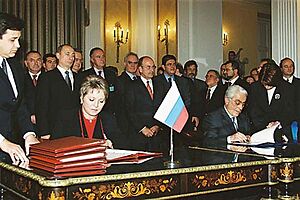
Valentina Matviyenko completed her studies at the Communist Party of the Soviet Union's Academy in 1985. She then became a party official in the local government of Leningrad. From 1984 to 1986, she was a top leader for the Communist Party in the Krasnogvardeysky District of the city.
She was chosen as a people's deputy for the Supreme Soviet of the Soviet Union. In this role, she led a committee that focused on issues related to women, families, and children.
Between 1991 and 1998, Matviyenko worked as a diplomat. She served as the Russian ambassador to Malta from 1991 to 1995. Later, she was the ambassador to Greece from 1997 to 1998.
On 24 September 1998, Valentina Matviyenko was appointed as the Deputy Prime Minister of Russia. Her main responsibility was welfare, which means looking after the well-being of people. She held this important position until 2003.
On 11 March 2003, she left her role as Deputy Prime Minister. President Vladimir Putin then appointed her as his special representative for the Northwestern Federal District.
Governor of Saint Petersburg
Becoming Governor
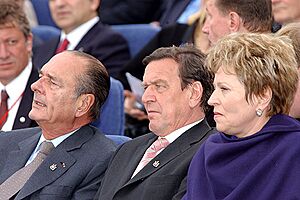
On 24 June 2003, the governor of Saint Petersburg, Vladimir Yakovlev, stepped down early. Valentina Matviyenko announced that she was ready to run for the position. Her nomination was supported by the United Russia political party and President Vladimir Putin. Putin publicly showed his support for her on 2 September.
The first round of elections took place on 21 September 2003. Matviyenko received the most votes, with 48.61%. The turnout for the election was low, with only 29% of people voting. On 5 October 2003, Matviyenko won the second round of voting. She received 63% of the votes and was elected as the Governor of Saint Petersburg. She made history by becoming the first female leader of Saint Petersburg.
Continuing in Office
In 2005, a new law in Russia changed how governors were chosen. Instead of being elected by people, governors would now be suggested by the President of Russia. Then, regional lawmakers would approve or disapprove them. On 6 December 2006, Valentina Matviyenko asked Vladimir Putin to nominate her under this new law. He agreed, and she was approved by the Saint Petersburg Legislative Assembly on 22 December 2006.
City Development and Improvements
Budget and Economy
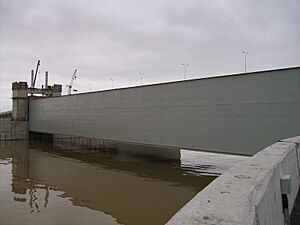
When Matviyenko became governor, she promised to bring more tax money from the national government to Saint Petersburg. President Putin, who is from Saint Petersburg, supported this idea. This helped the city's economy grow and attracted more investments. As a result, the standard of living in Saint Petersburg improved a lot. People's incomes became much closer to those in Moscow, and much higher than in most other Russian regions.
City's Importance
Saint Petersburg's role in Russian politics became more important. For example, the Constitutional Court of Russia moved from Moscow to Saint Petersburg in 2008. This showed the city's growing influence.
New Buildings and Roads

Matviyenko oversaw many large construction projects in Saint Petersburg. These included new housing and important infrastructure. For example, the Saint Petersburg Ring Road was built, which included the Big Obukhovsky Bridge. This bridge is special because it's the only non-draw bridge over the Neva River in the city.
Another big project was the completion of the Saint Petersburg Dam. This dam was built to stop the city from experiencing floods, which had been a problem for a long time. Also, a new subway line, Line 5 of Saint Petersburg Metro, was opened.
Growing Industries
During her time as governor, many major car companies decided to build factories in or near Saint Petersburg. These included Toyota, General Motors, Nissan, Hyundai Motor, Suzuki, Magna International, Scania, and MAN SE. Many of these plants are in the Shushary industrial area. This made Saint Petersburg a very important center for making foreign car brands in Russia.
Tourism Boom
Tourism also grew significantly under Matviyenko's leadership. The city administration started programs to attract more tourists. They also worked to improve hotels and other tourist facilities. By 2010, the number of tourists visiting Saint Petersburg had doubled to 5.2 million. This made the city one of the top five tourist destinations in Europe.
Cultural Events
The annual celebration for school graduates, known as the Scarlet Sails, became much bigger during Matviyenko's time. This event, which is part of the White Nights Festival, even began to be shown on national television.
Challenges and Criticisms
Building Projects and City History
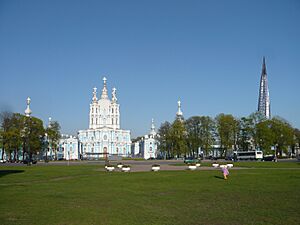
Some of Matviyenko's building projects faced criticism. People were concerned about new construction in areas that were already very developed. Many experts and citizens felt that some new buildings did not fit with the classical architecture of the city. The entire city center is a UNESCO World Heritage Site, meaning it's protected for its historical importance.
One project that caused a lot of debate was the Okhta Center skyscraper. This 400-meter-tall building was planned near the historic Smolny Cathedral. City rules usually limit buildings to 42 meters, but these rules were changed for this project. After many public protests and the involvement of Russian President Dmitry Medvedev, the Okhta Center was moved to a different area called Lakhta.
Snow Removal Issues
In the last two years of her time as governor, during the very cold and snowy winters of 2009–2010 and 2010–2011, Matviyenko faced criticism for how the city handled snow removal. The city authorities were not ready for the large amounts of snow, especially in the historical center. There was also a shortage of snow-cleaning equipment.
Chairwoman of the Federation Council
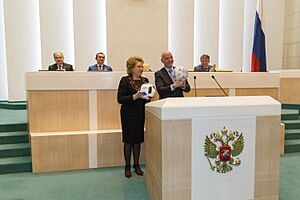
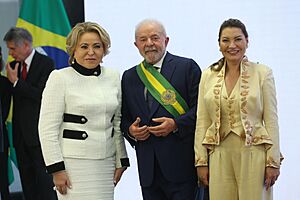
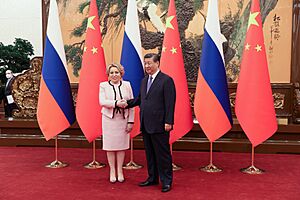
On 22 August 2011, after the Saint Petersburg Dam and Ring Road were finished, Matviyenko resigned as governor. Georgy Poltavchenko took over as acting governor. President Dmitry Medvedev supported her as a candidate to lead the Federal Assembly, which is the upper house of the Russian parliament.
As a member of the United Russia party, Matviyenko participated in a local election in August 2011. This was a necessary step for her to legally become part of the Federation Council. She won the election with a very high percentage of votes. On 21 September 2011, Valentina Matviyenko was elected as the Chairwoman of the Federation Council. This is one of the highest elected positions in Russia.
International Sanctions
Due to her role in the 2014 events in Crimea, Valentina Matviyenko was among the first people to face sanctions from other countries. Sanctions are actions taken by governments to punish another country or individuals. For example, the United States President Barack Obama froze her assets in the US and banned her from entering the country.
She was also added to sanction lists by Canada, the European Union, Switzerland, Liechtenstein, Australia, and Ukraine in 2014 and 2016. The UK government also sanctioned her in 2014. In response to the 2022 events in Ukraine, the United States added Matviyenko to another list of sanctioned individuals on 6 April 2022.
Family Life
Valentina Matviyenko has a son named Sergey, who was born on 5 May 1973. His father is Vladimir Vasilyevich Matviyenko, Valentina's husband. In May 2003, Sergey Matviyenko became a vice-president at Bank Saint Petersburg. Later, he also held positions as vice-president and first vice-president at Vneshtorgbank. Sergey married a Russian pop singer named Zara Mgoyan in 2004, but they divorced about a year later.
Honours and Awards
Valentina Matviyenko has received many awards and honors throughout her career, both from Russia and other countries. These awards recognize her significant contributions to the state and her work in various fields.
- Awards from Russia and the Soviet Union
- Hero of Labour of the Russian Federation (2024)
- Order of St. Andrew the First-Called (2019)
- P. A. Stolypin Medal, 1st class (2014)
- Order "For Merit to the Fatherland": 1st, 2nd, 3rd, and 4th classes (2014, 2009, 1999, 2003)
- Medal "In Commemoration of the 300th Anniversary of Saint Petersburg" (2003)
- Order of Honour (1996)
- Order of the Red Banner of Labour (1981)
- Order of the Badge of Honour (1976)
- Awards from the Russian President
- Russian Federation Presidential Certificate of Honour (2010)
- Russian Federation Presidential Gratitude (2008, 1995)
- Awards from Russian Government Departments
- Medal "For Cooperation" (Russian Prosecutor's Office, 2010)
- Medal "For merits in national security" (Security Council, 2009)
- Medal "For Strengthening Customs Community" (Federal Customs Service, 2008)
- Medal "100 Years of St. Petersburg University, GPA MES of Russia" (Ministry of Emergency Situations, 2006)
- Medal "Admiral Kuznetsov" (Ministry of Defence, 2005)
- Medal "For Cooperation With the FSB of Russia" (Federal Security Service, 2004)
- Badge "For Personal Contribution to the Protection and Improvement of Civil Defence" (2004)
- Medal "For Merits in the Field of Civil Aviation" (Interstate Aviation Committee, 2004)
- Medal "For Military Cooperation" (Ministry of Internal Affairs, 2003)
- Medal "For Services to the National Health Care" (Ministry of Health and Social Development, 2003)
- Badge "Excellent Border Troops" (Border Guard Service of Russia, 2003)
- Medal "For Strengthening Military Cooperation" (Ministry of Defence, 1999)
- Awards from Russian Regions
- Honorary Citizen of Kislovodsk (2019)
- Jubilee Badge of the Moscow Oblast Duma "25 Years of the Moscow Oblast Duma" (2018)
- Honorary Citizen of St. Petersburg (2017)
- Jubilee Badge of the Moscow Oblast Duma "20 Years of the Moscow Oblast Duma" (2013)
- Badge of Honour "For Services to St. Petersburg" (2011)
- Badge of Honour "For a Special Contribution to the Development of St. Petersburg" (Legislative Assembly of Saint Petersburg, 2015)
- Awards from Other Countries
- Order of Solidarity (Cuba, 2022)
- Order "For Contribution to the Development of Cooperation" (Turkmenistan, 2022)
- Dustliq Order (Uzbekistan, 2021)
- Order of Francysk Skaryna (Belarus, 2019)
- Order of Friendship, 1st class (Kazakhstan, 2019)
- Dostlug Order (Azerbaijan, 2019)
- Order of the Republika Srpska (Republika Srpska, Bosnia and Herzegovina, 2018)
- Order of Friendship, 2nd class (Kazakhstan, 2016)
- National Order of Merit (Malta, 2013)
- National Order of the Legion of Honour (France, 2009)
- Order "For The Great Love of Independent Turkmenistan" (Turkmenistan, 2009)
- Order of the Friendship of Peoples (Belarus, 2009)
- Knights Cross of the Order of the Lion of Finland (2009)
- Medal "For Outstanding Contributions to the National Year of China and Russia" (China, 2008)
- Grand Cross of the Order of Honour (Greece, 2007)
- Order of Princess Olga, 3rd class (Ukraine, 2002)
- Decoration of Honour for Services to the Republic of Austria (2001)
- Religious Awards
- Order of St. Sergius; 1st class (Russian Orthodox Church, 2010)
- Order of St Princess Olga, 1st class (Russian Orthodox Church, 2006) and 2nd class (2001)
- Other Recognitions
- Prize of the Russian Federation in Science and Technology (2010)
- Pushkin Medal (MAPRYAL, 2003)
Images for kids
See also
 In Spanish: Valentina Matvienko para niños
In Spanish: Valentina Matvienko para niños
 | Delilah Pierce |
 | Gordon Parks |
 | Augusta Savage |
 | Charles Ethan Porter |


